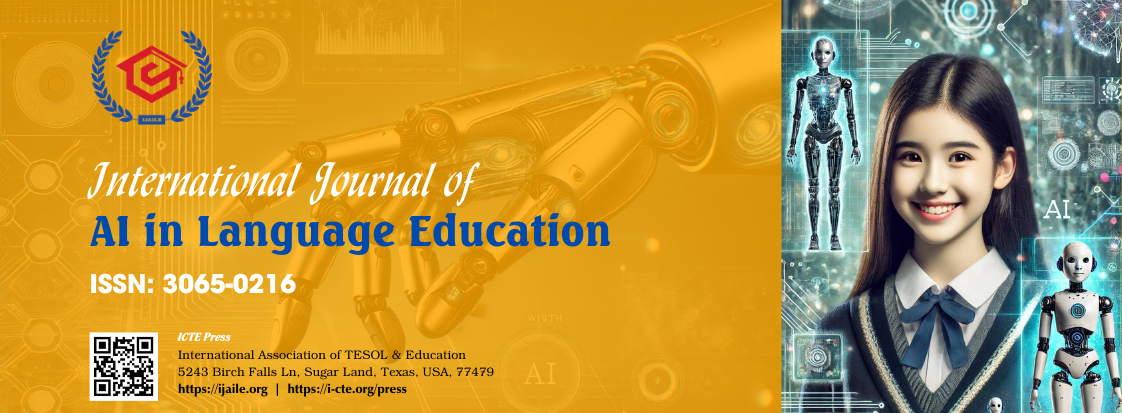AI Tools in Learning Academic Writing: Benefits and Challenges for MA Students in the English Language Studies at the Industrial University of Ho Chi Minh City
DOI:
https://doi.org/10.54855/ijaile.25215Keywords:
AI tools in academic writing, challenges in academic writing, advantages of AI tools in academic writingAbstract
Many Master of Arts (MA) students believe that these tools offer significant benefits for improving writing abilities, though some challenges can hinder progress. This study explores the use of Artificial Intelligence (AI) tools in academic writing among MA students, focusing on English majors at IUH. The research investigates both the benefits and challenges of AI tools like writing assistants and language models in improving students' writing proficiency. A sample of 30 MA students was selected, and a mixed-method approach was employed, combining quantitative data from questionnaires and qualitative insights from semi-structured interviews. The questionnaires collected students' perceptions on the advantages and difficulties of using AI tools for academic writing, while the interviews provided a deeper understanding of how these tools are utilized in practice. Findings indicate that AI tools offer significant benefits, such as improving writing skills and providing support, but they also introduce challenges, including over-reliance and limitations in addressing complex writing issues.References
Al Mahmud, F. (2023). Investigating EFL students’ writing skills through artificial intelligence: Wordtune application as a tool. Journal of Language Teaching and Research, 14(5), 1395–1404. https://doi.org/10.17507/jltr.1405.28 DOI: https://doi.org/10.17507/jltr.1405.28
Amyatun, R. L. & Kholis, A. (2023). Can artificial intelligence (AI) like QuillBot AI assist students’ writing skills? Assisting learning to write texts using AI. ELE Reviews: English Language Education Reviews, 3(2), 135–154. https://doi.org/10.22515/elereviews.v3i2.7533 DOI: https://doi.org/10.22515/elereviews.v3i2.7533
Aldabbus, S., & Almansouri, E. (2022). Academic writing difficulties encountered by university EFL learners. British Journal of English Linguistics, 10(3), 1–11. https://www.researchgate.net/publication/362821826_Academic_Writing_Difficulties_Encountered_by_University_EFL_Learners DOI: https://doi.org/10.37745/bjel.2013/vol10n3111
Bautista, R. M., & Pentang, J. T. (2022). Ctrl C + Ctrl V: Plagiarism and knowledge on referencing and citation among pre-service teachers. International Journal of Multidisciplinary: Applied Business and Education Research, 3(2), 245–257. https://www.researchgate.net/publication/358578118_Ctrl_C_Ctrl_V_Plagiarism_and_Knowledge_on_Referencing_and_Citation_among_Pre-service_Teachers DOI: https://doi.org/10.11594/ijmaber.03.02.10
Chauke, T., Mkhize, T., Methi, L., & Dlamini, N. (2024). Postgraduate students’ perceptions on the benefits associated with artificial intelligence tools on academic success: In case of ChatGPT AI tool. Journal of Curriculum Studies Research, 6(1), 44–59. https://doi.org/10.46303/jcsr.2024.4 DOI: https://doi.org/10.46303/jcsr.2024.4
D. Obeng-Ofori, C. Chinaza Adaobi, & Atianashie Miracle A. (2025). Understanding Turnitin: A Comprehensive Guide for Students and Educators. https://www.researchgate.net/publication/389279246_Understanding_Turnitin_A_Comprehensive_Guide_for_Students_and_Educators/comments - fullTextFileContent
Ghufron, M. A., & Rosyida, F. (2018). The Role of Grammarly in Assessing English as a Foreign Language (EFL) Writing. Lingua Cultura, 12(4), 395-403. https://journal.binus.ac.id/index.php/Lingua/article/view/4582 DOI: https://doi.org/10.21512/lc.v12i4.4582
Khalifa, M., & Albadawy, M. (2024). Using artificial intelligence in academic writing and research: an essential productivity tool. Computer Methods and Programs in Biomedicine Update, 5, 1-11. https://doi.org/10.1016/j.cmpbup.2024.100145 DOI: https://doi.org/10.1016/j.cmpbup.2024.100145
Kim, J., Yu, S., & Detrick, R. (2025). Exploring students’ perspectives on generative AI-assisted academic writing. Education and Information Technologies, 30, 1265–1300. https://link.springer.com/article/10.1007/s10639-024-12878-7 - Sec20 DOI: https://doi.org/10.1007/s10639-024-12878-7
Khongtim, J., Chyne, R. C., & Wann, T. (2024). Exploring the influence of generative AI on academic writing among postgraduate students of North-Eastern Hill University. ir.inflibnet.ac.in:8443/ir/bitstream/1944/2469/1/10.pdf
Kurniati, E. Y., & Fithriani, R. (2022). Postgraduate students' perceptions of Quillbot utilization in English academic writing class. Journal of English Language Teaching and Linguistics, 7(3), 437-451. https://www.researchgate.net/publication/366307939_Post-Graduate_Students%27_Perceptions_of_Quillbot_Utilization_in_English_Academic_Writing_Class DOI: https://doi.org/10.21462/jeltl.v7i3.852
Mudawy, A. M. A., & Mousa, A. A. E. (2017). Academic writing among Saudi university students: Problems and solutions. International Journal of Science and Research (IJSR), 6(5), 1–4.
Miao, J., Thongprayoon, C., Suppadungsuk, S., Garcia Valencia, O. A., Qureshi, F., & Cheungpasitporn, W. (2024). Ethical dilemmas in using AI for academic writing and an example framework for peer review in nephrology academia: A narrative review. Clinical Practice, 14, 89–105. https://doi.org/10.3390/clinpract14010008 DOI: https://doi.org/10.3390/clinpract14010008
Nguyen, T. Y. P., Nguyen, N. T., & Phan, N. K. H. (2025). The Challenges of Applying ChatGPT in the Academic Writing of Postgraduate Students in English Major at IUH. International Journal of AI in Language Education, 2(1), 20-37. https://doi.org/10.54855/ijaile.25212 DOI: https://doi.org/10.54855/ijaile.25212
Utami, W., Marzuki, W., Rusdin, D., & Indrawati, I. (2023). The impact of AI writing tools on the content and organization of students’ writing: EFL teachers’ perspectives. Cogent Education, 10(2), 2236469. https://doi.org/10.1080/2331186X.2023.2236469 DOI: https://doi.org/10.1080/2331186X.2023.2236469
Ozfidan, B., El-Dakhs, D. A. S., & Alsalim, L. A. (2024). The Use of AI Tools in English Academic Writing by Saudi Undergraduates. Contemporary Educational Technology, 16(4), 1-13. https://files.eric.ed.gov/fulltext/EJ1449345.pdf DOI: https://doi.org/10.30935/cedtech/15013
Pham, N. Q. N. (2024). The perspectives of postgraduates majoring in English regarding the usage of QuillBot to enhance paraphrasing skills. International Journal of AI in Language Education, 1(1), 29–40. https://doi.org/10.54855/ijaile.24113 DOI: https://doi.org/10.54855/ijaile.24113
Shahid, A., Khan, A., & Rao, R. R. (2024). An exploration of the effectiveness of artificial intelligence (AI) tools in English language learning at the undergraduate level in Pakistan. Human Nature Journal of Social Sciences, 5(2), 347–357. https://www.sciencedirect.com/science/article/pii/S0957417424010339 DOI: https://doi.org/10.71016/hnjss/vmvan923
Song, C., & Song, Y. (2023). Enhancing academic writing skills and motivation: Assessing the efficacy of ChatGPT in AI-assisted language learning for EFL students. Frontiers in Psychology, 14, 1260843. https://doi.org/10.3389/fpsyg.2023.1260843 DOI: https://doi.org/10.3389/fpsyg.2023.1260843
Su A. A. T. & Tran T. H. N. (2024). The Benefits and Weaknesses of ChatGPT on Students’ Learning Writing. International Journal of AI in Language Education. 1(1), 20-28. https://doi.org/10.54855/ijaile.24112 DOI: https://doi.org/10.54855/ijaile.24112
Tardy, C. M. (2010). Writing for the world: Wikipedia as an introduction to academic writing. English Teaching Forum, 48(1), 12–27. https://files.eric.ed.gov/fulltext/EJ914884.pdf
Utami, S. P. T., & Winarni, R. (2023). Utilization of artificial intelligence technology in an academic writing class: How do Indonesian students perceive? Contemporary Educational Technology, 15(4), 1-13. https://www.researchgate.net/publication/374352163_Utilization_of_artificial_intelligence_technology_in_an_academic_writing_class_How_do_Indonesian_students_perceive DOI: https://doi.org/10.30935/cedtech/13419
Downloads
Published
Issue
Section
License
Copyright (c) 2025 Tran Hong Ngoc, Le Thi Thuy Ngan, Tran Vu Bich Uyen (Author)

This work is licensed under a Creative Commons Attribution 4.0 International License.












